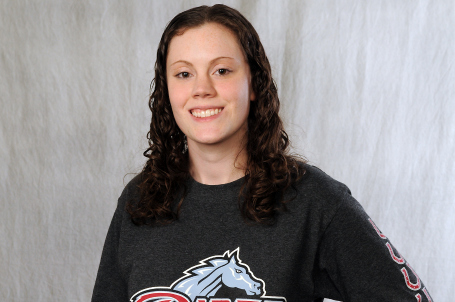Thursday, May 29, 2014
Amy Laundau ’14 leveraged her fraud and business forensics studies to land an internship with the federal agency
by Adam Grybowski
This year the FBI conducted a five-month background check against Amy Laundau ’14. She was then given a drug test and, following that, a polygraph.
“It was pretty nerve wracking,” says the accounting major, who — far from being investigated — was applying for an internship with the federal agency so she could become the investigator.
Landua sailed through the tests and began interning full time in the department’s Newark office from June 3 to Aug. 9, 2013, helping to investigate alleged criminals by examining bank statements, following paper trails and piecing together who was paying whom.
The FBI has headquarters in Washington, D.C., but maintains field offices in every state. About 13 forensic accountants work in the New Jersey offices, generally investigating suspects before they are officially charged with a crime. Cases range from white-collar offenses like bank or health care fraud to political corruption to terrorism.
“Everyone is very serious about the work, but the atmosphere is laid back,” Landau says. “I definitely felt like what I was doing was important. There was a purpose to each day: helping put bad people away.”
Though her internship officially ended, she continues to spend a minimum of 16 hours a month at the FBI, mostly on weekends, to keep her security clearance. “I want to look into pursuing this as a career,” she says. “Having security clearance would make one less hurdle to getting a job with the FBI.”
Landau graduated in May with a concentration in fraud and business forensics, which prepares students to prevent fraud from occurring and discovering it after it’s already happened. “I always wanted to investigate things but science is not my thing,” she says. “Being able to investigate crime using numbers is very interesting.”
Landau, who’s already begun the Master of Accountancy program and hopes to finish after the fall semester, says attention to detail, strong analytical skills and facility with numbers are essential to doing the job well. Of course technology plays a role too. “I’ve never gone a day without using Excel,” she says.
Math has always been Landau’s favorite class, but it took a push from her mom to take an accounting class in high school. Despite the resistance — “I never thought I would want to major in accounting,” she says — it became her favorite course. “I felt like I was good at it. Solving puzzles with numbers was something I understood,” she says.
She picked up the fraud and forensic concentration in her sophomore year at Rider. “I thought it would be a good way of applying what I’ve learned to go into law enforcement,” she says.
As she was preparing to graduate, the Bridgewater native also interned with PricewaterhouseCoopers, traveling to its office in New York City to work in the audit department. “It’s a different side of accounting,” she says.
Perhaps the most noticeable difference? To be considered for a job, PwC requires no polygraph.

